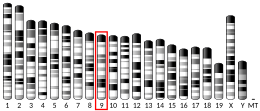PCNA-associated factor is a protein that in humans is encoded by the KIAA0101 gene .[ 5] [ 6] [ 7]
PCLAF Identifiers Aliases PCLAF External IDs OMIM : 610696 ; MGI : 1915276 ; HomoloGene : 8829 ; GeneCards : PCLAF ; OMA :PCLAF - orthologs Wikidata
^ a b c GRCh38: Ensembl release 89: ENSG00000166803 – Ensembl , May 2017^ a b c GRCm38: Ensembl release 89: ENSMUSG00000040204 – Ensembl , May 2017^ "Human PubMed Reference:" . National Center for Biotechnology Information, U.S. National Library of Medicine .^ "Mouse PubMed Reference:" . National Center for Biotechnology Information, U.S. National Library of Medicine .^ a b Yu P, Huang B, Shen M, Lau C, Chan E, Michel J, Xiong Y, Payan DG, Luo Y (Jan 2001). "p15(PAF), a novel PCNA associated factor with increased expression in tumor tissues" . Oncogene . 20 (4): 484–9. doi :10.1038/sj.onc.1204113 PMID 11313979 . ^ Simpson F, Lammerts van Bueren K, Butterfield N, Bennetts JS, Bowles J, Adolphe C, Simms LA, Young J, Walsh MD, Leggett B, Fowles LF, Wicking C (Jan 2006). "The PCNA-associated factor KIAA0101/p15(PAF) binds the potential tumor suppressor product p33ING1b". Experimental Cell Research . 312 (1): 73–85. doi :10.1016/j.yexcr.2005.09.020 . PMID 16288740 . ^ "Entrez Gene: KIAA0101 KIAA0101" .
Shi L, Zhang SL, Li K, Hong Y, Wang Q, Li Y, Guo J, Fan WH, Zhang L, Cheng J (Feb 2008). "NS5ATP9, a gene up-regulated by HCV NS5A protein". Cancer Letters . 259 (2): 192–7. doi :10.1016/j.canlet.2007.10.029 . PMID 18068894 . Guo M, Li J, Wan D, Gu J (2006). "KIAA0101 (OEACT-1), an expressionally down-regulated and growth-inhibitory gene in human hepatocellular carcinoma" . BMC Cancer . 6 : 109. doi :10.1186/1471-2407-6-109 PMC 1483895 PMID 16646990 . Mizutani K, Onda M, Asaka S, Akaishi J, Miyamoto S, Yoshida A, Nagahama M, Ito K, Emi M (May 2005). "Overexpressed in anaplastic thyroid carcinoma-1 (OEATC-1) as a novel gene responsible for anaplastic thyroid carcinoma" . Cancer . 103 (9): 1785–90. doi :10.1002/cncr.20988 PMID 15789362 . Petroziello J, Yamane A, Westendorf L, Thompson M, McDonagh C, Cerveny C, Law CL, Wahl A, Carter P (Oct 2004). "Suppression subtractive hybridization and expression profiling identifies a unique set of genes overexpressed in non-small-cell lung cancer" . Oncogene . 23 (46): 7734–45. doi :10.1038/sj.onc.1207921 PMID 15334068 . Nagase T, Miyajima N, Tanaka A, Sazuka T, Seki N, Sato S, Tabata S, Ishikawa K, Kawarabayasi Y, Kotani H (1995). "Prediction of the coding sequences of unidentified human genes. III. The coding sequences of 40 new genes (KIAA0081-KIAA0120) deduced by analysis of cDNA clones from human cell line KG-1" . DNA Research . 2 (1): 37–43. doi :10.1093/dnares/2.1.37 PMID 7788527 .





